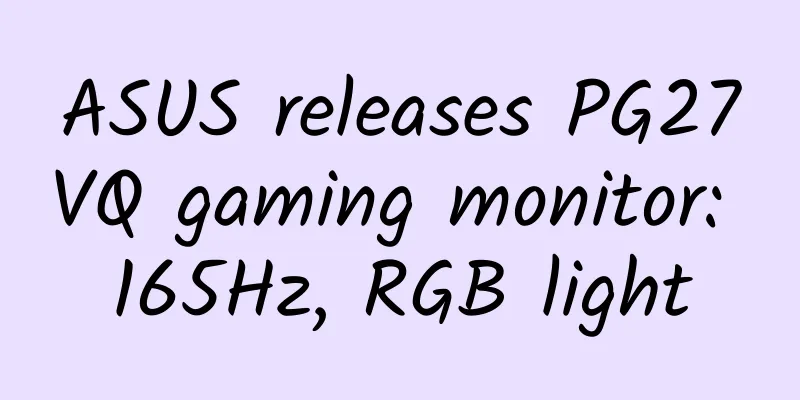ASUS releases PG27VQ gaming monitor: 165Hz, RGB light

|
RGB lights have now spread to every corner inside and outside the chassis, and now even monitors have "fallen". ASUS has prepared three RGB LED lighting effect monitors at once. The first one is the relatively cheap ROG Strix XG27VQ (US$350), and now the new "ROG Swift PG27VQ" is also here. The monitor uses a 27-inch TN panel, a curved screen curvature of 1800R, a resolution of 2560×1440, a refresh rate that can be overclocked to up to 165Hz, a response time of 1ms, a brightness of 400nit, a contrast ratio of 1000:1, a horizontal and vertical viewing angle of 170/160 degrees, and an adjustable stand. The interface provides one HDMI 1.4, one DisplayPort 1.2, two USB 3.0 and a headphone jack. As a ROG product, it also supports a range of gaming features, such as NVIDIA G-Sync, NVIDIA ULMB (ultra-low motion blur), 3D Vision and other technologies, and has joined the ranks of ASUS Aura Sync RGB lighting effects. Of course, it lights up on the back, so it is for visitors to see, not for users. Interestingly, the bottom of the stand will project the ROG LOGO onto the desktop and can be customized. The price is US$799.99, which is approximately RMB 5,300. |
<<: How to reduce the incidence of human error in data centers
>>: Practical tips: Teach you step by step to solve the problem of WiFi interference
Recommend
Cyber Security Awareness Week丨Ruishu Information explains how to ensure data security?
It has been one year since the Data Security Law ...
With a downlink rate of over 100Mbps, can Starlink really replace 5G?
According to Mobile World Live, Ookla's lates...
You must know the five common misconceptions about HTTPS
Nowadays, the https protocol is widely valued and...
Justhost newly launched Singapore node, 20% discount, monthly payment starts from US$5.2
Strictly speaking, the Singapore node is not a ne...
Simple test of BandwagonHost special price annual VPS (Softbank, Osaka, Japan)
Didn't I buy a VPS with annual payment from B...
Virtono New Year promotion VPS 55% off, 11 data centers in the United States/France/Netherlands/Romania, etc.
Virtono recently launched a 2022 New Year promoti...
The three major operators announced the "Implementation Rules for Number Portability Service"
On November 10, the Ministry of Industry and Info...
"Broadband China" has not yet succeeded. FTTH should move from "bombardment" to "intensive cultivation".
FTTH has been around for 14 years since its promo...
Analyzing the core technology behind 5G: beamforming
Virtual reality, drones, and autonomous driving, ...
Can the three major operators jointly develop Fetion to compete with WeChat?
A recent tender notice from China Mobile has brou...
Wangsu Technology launches edge AI gateway to help developers build AI
On July 11, Wangsu Technology announced the launc...
After the fourth retail revolution, three experts from WOT tell you what real smart retail is!
[51CTO.com original article] On June 21, the WOT2...
Gcore: Khabarovsk/Vladivostok KVM from 1.08 Euros per month, 488M memory/8G hard disk/288G monthly traffic
G-core (gcorelabs) has been shared several times ...
A brief discussion on "lossless network": ECN and PFC technology
Basic concepts of lossless network First of all, ...
Why is NB-IoT, which once "firmly sat" at the top of the low-power Internet of Things, now frequently "questioned"?
With the advent of the Internet of Things era, th...









